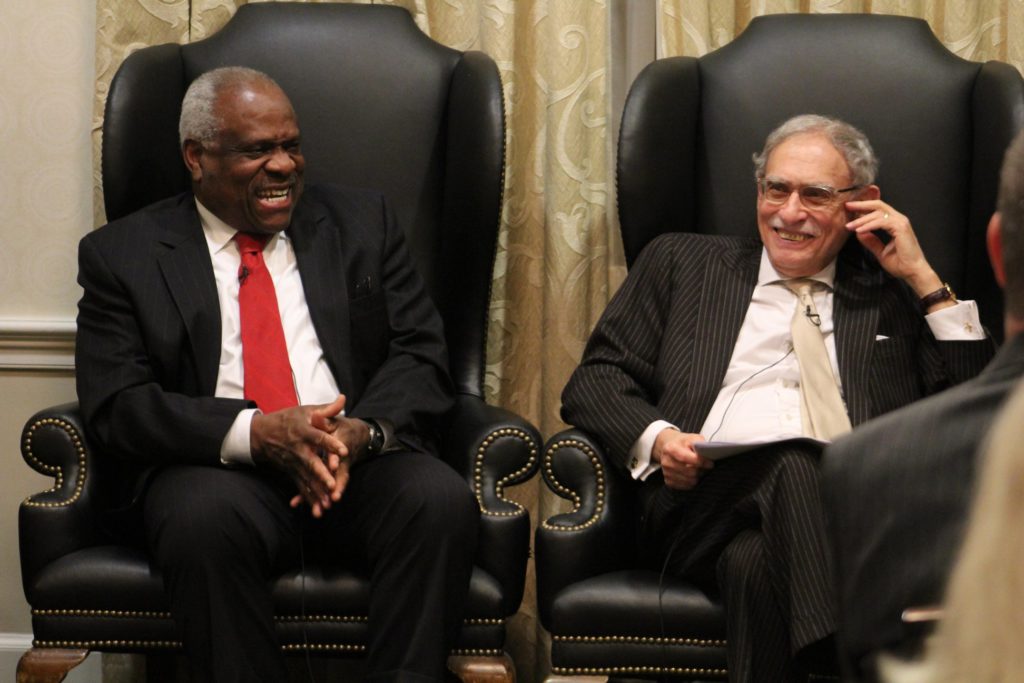
After the U.S. Supreme Court released its ruling in Dobbs, many progressives seemed far more upset about Justice Clarence Thomas’ concurrence than Justice Samuel Alito’s majority opinion. To see why, we need to understand what the majority opinion said and why Justice Thomas went even further.
In the majority opinion, Justice Alito assures us that the court’s finding that there is no constitutional right to abortion does not mean that other rights that seem to be just as absent from the text of the Constitution are now imperiled. These rights—often referred to as “unenumerated rights”—include the right to contraception, intimate same-sex relations, and same-sex marriage. The difference between these rights and the purported right to abortion, argues Alito, is that the latter involves a third party, the unborn human being, whose life the state surely has an interest in protecting, while the former do not.
But at the core of Justice Alito’s rejection of abortion as an unenumerated right is its absence from both English common law and U.S. statutory law before the 1960s. He argues that whenever the court recognizes an unenumerated right, it does so by determining whether the supposed right is “deeply rooted in this Nation’s history and tradition” and “implicit in the concept of ordered liberty.” Not only did Roe (and by implication, Casey) fail this test, the case it attempted to make was built on misleading claims and historical fabrications.
A court’s recognition (or non-recognition) of a purported unenumerated right is part of what is sometimes called “substantive due process analysis.” The reasoning goes like this: The Fifth and 14th amendments affirm that neither the federal government nor a state may deprive anyone of “life, liberty, or property, without due process of law.” But there seem to be certain activities and relationships—such as marriage, the education of one’s children, and personal privacy—that should not be subject to government regulation or prohibition, even though they are not mentioned in the Constitution and even if the laws that empowered the government’s actions were passed by a duly elected legislature using legitimate procedures. Because we believe we cannot have a functioning society—a regime of ordered liberty—without a right to marry, a right to direct the education of one’s children, and the right to have a private life, “this Nation’s history and tradition” presupposes these rights.
But the problem for liberal jurists is that some of the unenumerated rights they champion do not have that sort of historical pedigree. This is why they supplement the history and tradition test with something more abstract like “evolving standards of decency,” which has allowed the court to “discover” new constitutional rights that seem to be manufactured out of whole cloth.
Although agreeing with Justice Alito that under the court’s substantive due process analysis abortion is not a fundamental right, Justice Thomas argues that the court should reconsider the whole idea of substantive due process, not because Justice Thomas doesn’t believe there are unenumerated rights but because substantive due process, as a concept, is flatly incoherent. You simply cannot derive a substantive right to abortion, same-sex marriage, or contraception from a guarantee of a fair and impartial process. Moreover, judges, guided by their own value preferences and unmoored from the Constitution’s text, have used something like substantive due process to justify all sorts of egregious rulings, including Dred Scott, not to mention Roe and Casey.
Justice Thomas, as I have already noted, does not reject unenumerated rights out of hand. But, as he argues in his concurrence, if there are such rights, they should be grounded in the privileges and immunities clause of the 14th Amendment, which is a more natural fit than the due process clause: “No State shall make or enforce any law which shall abridge the privileges or immunities of citizens of the United States.” Compared to substantive due process analysis, this route, argues Justice Thomas, would more tightly tether unenumerated rights to “this Nation’s history and tradition” via the Constitution’s text and provide a principled limit on what rights judges can recognize.
Justice Thomas does not shy away from the logical implications of his view: Because the court’s substantive due process holdings wrongly invented “rights” ranging from contraception to abortion and then same-sex marriage, those decisions should be reconsidered by the court in future cases. Under Justice Alito’s history and tradition standard (if secured by either substantive due process or the privileges and immunities clause), it’s pretty clear that none of these holdings, with the possible exception of Griswold, would pass constitutional muster.
Justice Thomas said out loud, so to speak, that the primary mechanism used to accomplish the goals of legal progressivism should be discarded by the court. He dared to say what flies in the face of modern progressivism. And this is why many court observers were more scandalized by Thomas’ opinion than by Alito’s.
This essay was originally published at WORLD. It is republished with permission.


